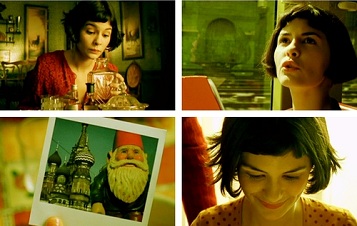Language: French (Le Fableux Destin d’Amélie)
Date of Release: 2001
Rating: 4.5/5
Surprisingly, albeit the mysterious expression on its poster, Amélie actually has a comical tone. The story is set in 1997, the year Lady Diana passed away. It revolves around Amélie Poulain, a kind-hearted, young girl who had had a peculiar childhood.
As a child she gets diagnosed with a heart-disease which she never had but that resulted in her home-schooling. Deprived of any friends, Amélie becomes a loner. She takes pleasures in little things such as sinking her hands in sacks full of pulses and picking stones that come in her path.
One day she finds a treasure box of toys hidden by a boy who used to live in her flat some thirty-six years ago. She sets on a mission to find that boy and return it to him. She enquires the building owner, the grocer and her neighbours, and finally succeeds in tracing the now-all-grown-up man.
She anonymously returns him his box and gets touched by the gratitude and nostalgia she sees in his eyes. Since then, Amélie decides to help mankind and serve the people in need. But gradually, she gets disheartened by her own lonesome life and even imagines herself dying at a young age of twenty-three and being popularly known as the ‘Madonna of unloved’.
She regularly pays visits to her father but he is only oblivious of her existence and is lost in his own sweet world. There is a ‘glass man’ in her building- a painter- in whose painting she reflects her life. Besides that, an odd collection of people at her workplace, a restaurant where she is a waitress, exist in her life.
Audrey Tautou, as Amélie Poulain, flawlessly portrays each expression of content, solitude, surprise and rage. Not even once does she let you lose that connection with young Amélie. The narration is beautifully embroidered. The movie is well paced.
It focuses on the beauty of being different as Amélie makes use of non-verbal communication with an unknown boy with equally diverse hobbies as hers (collecting torn and discarded photos from the instant-photo making machines installed in public places).
This is an admirable script; it goes smoothly till the end with special attention paid to how beautiful simple-everyday-incidents can be made. Watch it for the heartfelt background score and sudden judgmental actions of innocent Amélie.
